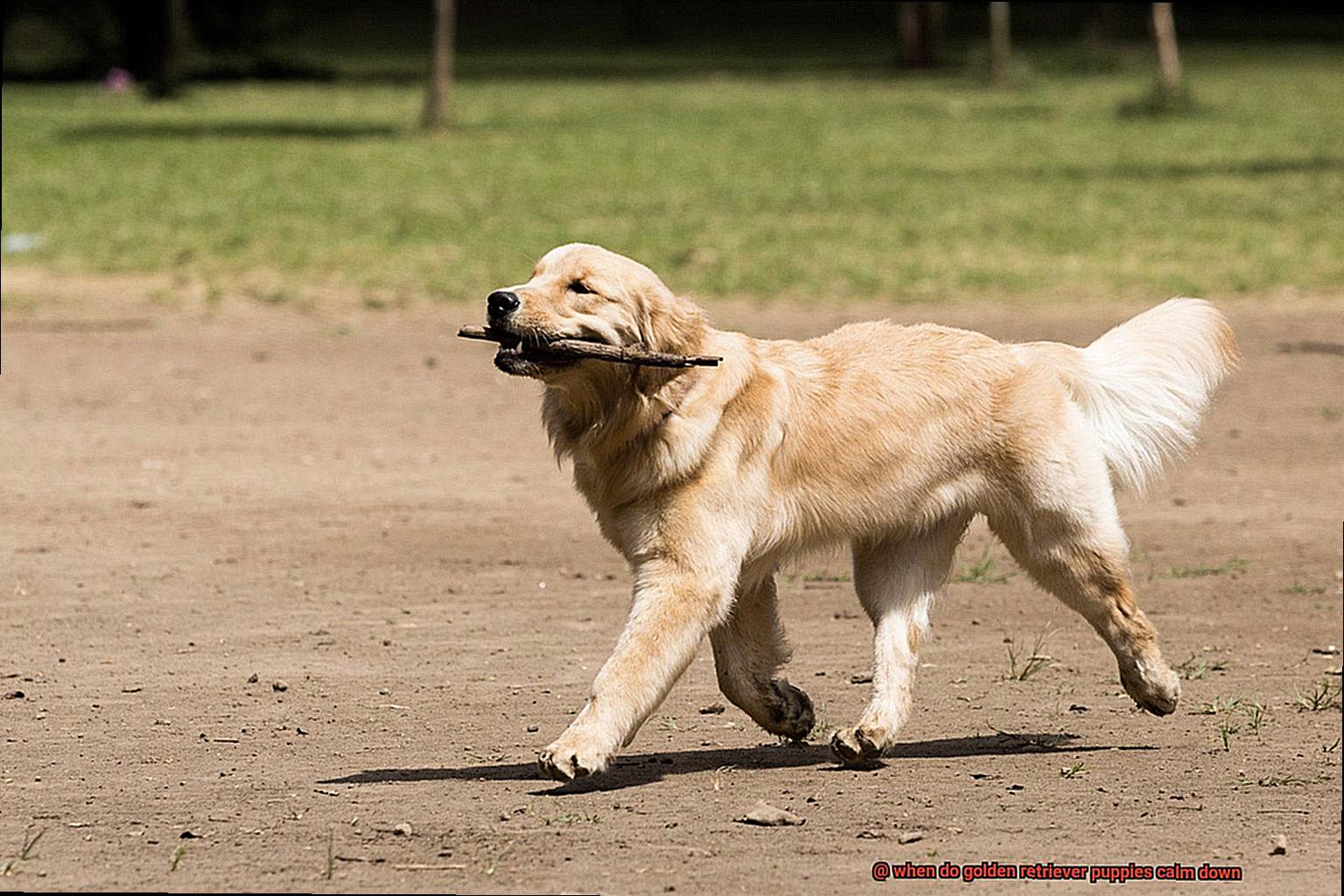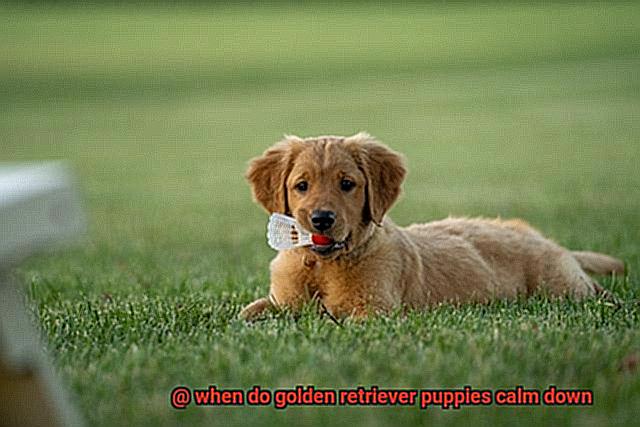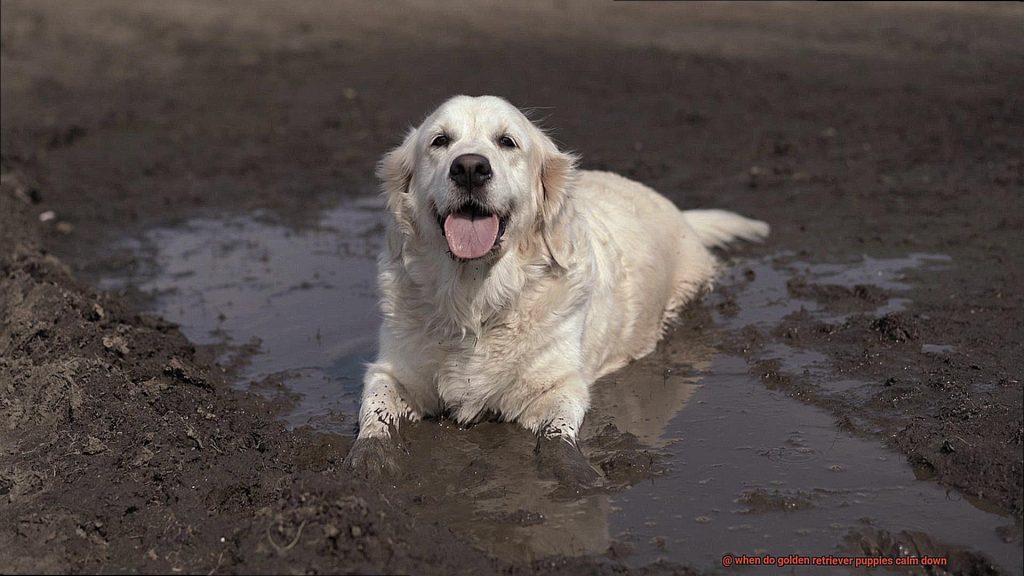Golden Retriever puppies are a bundle of joy and energy, bouncing around with their wagging tails and adorable faces. Their playful nature, love for attention, and eagerness to learn new things make them an ideal pet for families and individuals alike. But, let’s face it – their boundless energy can be overwhelming at times. As much as we adore their bubbly personalities, we cannot help but wonder when they will calm down.
The good news is that Golden Retrievers do eventually settle down; it just takes time and patience. Understanding the different stages of a Golden Retriever’s development is crucial in providing the best care for your furry friend.
The first phase is what I like to call the ‘adorable and bubbly’ stage. This phase typically lasts until they are three to six months old, where their energy levels peak. They’re full of life, jumping around, and getting into everything. It’s important to provide them with plenty of exercise and mental stimulation during this phase to help them burn off all that energy.
The second phase is known as the ‘cooling down’ stage and usually occurs between six and twelve months old. As they mature, Golden Retrievers tend to become calmer and more relaxed. Their energy levels begin to stabilize, making them easier to handle than in their earlier stage.
Although it’s essential to keep them active with regular exercise and playtime, you’ll notice that they won’t be as restless or demanding as they were before. This doesn’t mean that they won’t have moments of excitement or bursts of energy – after all, they’re still dogs.
In this blog post, we’ll explore the different stages of a Golden Retriever’s developmental phase in-depth while answering the question: when do Golden Retriever puppies calm down? Whether you’re a new pet owner or an experienced dog lover, understanding your furry friend’s behavioral patterns can help you provide better care and get the most out of your relationship. So, grab a cup of coffee, sit back, and let’s dive into the world of Golden Retrievers.
What is the Timeline for Golden Retriever Puppies Calming Down?
Contents
- 1 What is the Timeline for Golden Retriever Puppies Calming Down?
- 2 Factors that Impact a Puppy’s Energy Levels
- 3 Training and Socialization of a Golden Retriever Puppy
- 4 Benefits of Proper Training and Socialization of a Golden Retriever Puppy
- 5 Tips for Training and Socializing Your Golden Retriever Puppy
- 6 Conclusion
Don’t worry, this informative guide will help you understand the timeline for Golden Retriever puppies calming down.
Typically, Golden Retriever puppies start to calm down at around 6-8 months of age. However, this timeline can vary depending on the individual dog’s personality, environment, and training. Some puppies may take longer to settle down than others, so it’s essential to be patient and consistent with your care.
As Golden Retrievers grow older, they lose their puppy energy and settle into a more relaxed state. This process usually happens gradually over time, but most Golden Retrievers will reach their peak energy levels at around 2 years old. After that, they will start to mellow out and become calmer as they age.

Training and exercise play a crucial role in how quickly a Golden Retriever puppy will calm down. Proper training and socialization early on can help teach your puppy appropriate behavior and manners, making them more manageable even during their energetic phase. Regular exercise and playtime can also help burn off excess energy and prevent destructive behavior.
Remember, just like humans, dogs have unique personalities, and some may be more energetic or hyper than others. Therefore, it’s crucial to tailor your care to your puppy’s individual needs and personalities.
Factors that Impact a Puppy’s Energy Levels
Worry not, as there are several factors that impact a pup’s energy levels, and understanding them is crucial to providing the best care possible.
Age is one factor that affects your puppy’s energy levels. Golden Retriever puppies are known for their spirited nature and lively disposition, but as they grow older, their energy levels naturally decrease. Typically, Golden Retrievers start to mellow out around two to three years old, but this can vary depending on the individual pup.
Exercise is another critical factor to consider. Golden Retrievers are an active breed that requires plenty of exercise to stay healthy and happy. If your pup doesn’t get enough exercise, they may become hyperactive and have difficulty settling down. Conversely, if they get too much exercise, they may become overstimulated and find it challenging to calm down.
Diet is also an essential element when it comes to managing your pup’s energy levels. A well-balanced diet that meets their nutritional needs can help keep them healthy and energetic. However, indulging them in too many high-calorie treats or table scraps can lead to excessive weight gain and decreased energy levels.
Lastly, genetics can play a role in your pup’s energy levels. Some Golden Retrievers may be naturally more energetic or laid back than others due to their genetic makeup. Therefore, it’s crucial to research the breed and meet reputable breeders to ensure you’re getting a pup that fits your lifestyle and energy level preferences.

Training and Socialization of a Golden Retriever Puppy
Training and socialization are vital for ensuring your Golden Retriever puppy grows into a well-behaved, confident, and calm adult dog. Teaching basic obedience commands like “sit,” “stay,” and “come” using positive reinforcement techniques such as treats and praise is crucial from a young age. Golden Retrievers are eager to please their owners, and they respond well to rewards.
Socialization is also essential during the early stages of your pup’s life. Introduce them to different people, animals, and environments to help them become more confident and well-rounded adults. Make sure to expose your puppy to other dogs of all ages, sizes, and breeds to teach them proper social skills and prevent potential aggression.
Further, exposing your pup to various sounds, sights, and experiences can help prevent anxiety and fear-related behaviors. Taking them on walks in busy areas or introducing them to new toys and objects can help them become more comfortable in different situations.
It is crucial to continue training and socialization throughout your Golden Retriever’s life to ensure they remain well-behaved and calm adults. Consistency, patience, and positive reinforcement techniques are key in shaping your dog’s behavior. Remember that socialization is not a one-time event but an ongoing process.
Benefits of Proper Training and Socialization of a Golden Retriever Puppy
Training and socialization are like the keys to unlocking a happy, healthy, well-behaved adult dog.
Primarily, socializing your golden retriever puppy helps them learn how to behave in different situations. Introducing them to various people, animals, and environments can help them feel more comfortable and less anxious when encountering new experiences. Socialization helps your puppy learn how to interact with other dogs and people, preventing unwanted or aggressive behavior.
Furthermore, obedience training helps your puppy learn basic commands such as “sit,” “stay,” and “come.” Teaching these commands from an early age can help owners control their puppies’ behavior in different settings. This helps prevent problem behaviors from developing in the first place. Otherwise, puppies may develop issues like chewing or digging if they are not properly trained or socialized.
Moreover, training and socialization can help strengthen the bond between owners and their puppies. Taking the time to train and socialize your puppy shows them that you care about their well-being and are invested in their development. This can help build trust between owner and puppy, leading to a stronger bond overall.
Tips for Training and Socializing Your Golden Retriever Puppy
Golden retrievers are one of the most beloved dog breeds, known for their friendly personalities and boundless energy. However, without proper training and socialization, your furry friend may not reach their full potential. Here are five essential tips for training and socializing your golden retriever puppy:
Start Early
The earlier you start training and socializing your golden retriever puppy, the better. Puppies are more open to learning new things at a young age. By starting early, you can help your pup develop good behavior and become a well-adjusted member of your family.
Be Consistent
Consistency is key when it comes to training your golden retriever puppy. Use the same commands and techniques every time you train them. This will help them understand what is expected of them and avoid confusion.
Use Positive Reinforcement
Positive reinforcement is an effective way to train your golden retriever puppy. Reward them with treats, praise, or toys when they do something good. This method has proven to be very effective in training golden retrievers, as it encourages them to repeat that behavior in the future.
Socialize Often
Socializing your golden retriever puppy is essential for their mental and emotional well-being. Take them on walks, introduce them to new people and animals, and expose them to different environments. This will help them develop social skills and reduce the likelihood of fear or aggression towards new experiences.
Attend Puppy Classes
Attending puppy classes is an excellent way to socialize your golden retriever puppy while learning new training techniques. You’ll also have the opportunity to meet other dog owners and share experiences. Puppy classes are especially beneficial for first-time dog owners who may need guidance on how to train and socialize their pup.
Conclusion
Golden Retriever puppies are undoubtedly adorable with their playful personalities and boundless energy. However, as much as we love their liveliness, it’s only natural to wonder when they will calm down. The good news is that Golden Retrievers do eventually settle down; it just takes time and patience.
Understanding the different stages of a Golden Retriever’s development is vital in providing the best care for your furry friend. Typically, Golden Retriever puppies start to calm down at around 6-8 months of age. But this timeline can vary depending on various factors such as your dog’s personality, environment, and training.
Proper training and socialization early on can help teach your puppy appropriate behavior and manners, making them more manageable even during their energetic phase. Age, exercise, diet, and genetics also play a significant role in your pup’s energy levels.
It’s essential to tailor your care to your puppy’s individual needs and personalities. Training and socialization are vital for ensuring that your Golden Retriever puppy grows into a well-behaved, confident, and calm adult dog.
Socializing your golden retriever puppy helps them learn how to behave in different situations while obedience training helps them learn basic commands such as “sit,” “stay,” and “come.” By doing so, you’ll be setting the foundation for a long-lasting relationship built on trust and respect.
In conclusion, with proper care and attention to their developmental stages, you can enjoy many years of love and companionship with your calm and well-behaved Golden Retriever.









